Justin Taylor's Blog, page 89
December 17, 2014
Rebuilding Appalachia
The Appalachia Service Project—a Christian home repair/home building ministry through which volunteers and staff repair and build homes for low-income families in rural Central Appalachia—looks like a fantastic way for churches and Christian families to become the hands and feet of Christ in one of the poorest regions of the United States:
December 16, 2014
An Interview with Thomas Kidd on George Whitefield
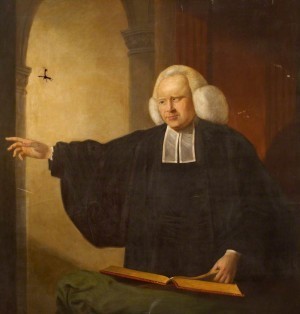 I recently sat down with Thomas Kidd, professor of history at Baylor University and associate director of Baylor’s Institute for Studies of Religion, to talk about his new biography of George Whitefield, recently published by Yale University Press.
I recently sat down with Thomas Kidd, professor of history at Baylor University and associate director of Baylor’s Institute for Studies of Religion, to talk about his new biography of George Whitefield, recently published by Yale University Press.
We talked about why he wrote the book, how famous Whitefield was, and explored some of his relationships (e.g., with his wife, with Benjamin Franklin, with the Wesley brothers, and with Jonathan Edwards).
If you first want a quick overview of Whitefield—who was born 300 years ago this month—here is a concise summary from J. I. Packer (who just happened to go to the same “junior school” that Whitefield attended in Gloucester and who was converted just across the street from Pembroke College where Whitefield came to a saving knowledge of the Lord):
The ‘Grand Itinerant’, as his contemporaries called him, was, more than anyone else, the trail-blazing pioneer and personal embodiment of the eighteenth-century revival of vital Christianity in the West, the revival that shaped English-speaking society on both sides of the Atlantic for over a hundred years and that fathered the evangelical missionary movement which for the past two centuries has been taking the gospel literally round the world. . . .
First to preach the transforming message of the new birth, first to take it into the open air and declare the world his parish, first to publish journals celebrating God’s work in and through him, and first to set up societies for the nurturing of those who came to faith under his ministry, Whitefield proclaimed Christ tirelessly throughout Britain and colonial America, drawing huge crowds, winning thousands of souls, impacting myriads more, and gaining celebrity status. . .
And if you want to hear what Packer thinks of Kidd’s work on Whitefield:
Thoroughly researched, and rooted in an exact knowledge of Whitefield’s times; critically perceptive while remaining appreciatively sympathetic; this is the best balanced and most illuminating chronicle of the Anglo-American Awakener’s career that has yet been produced.
Sirens: Free Audio Download and Animated Video from The Gray Havens
The great Scottish churchman Thomas Chalmers (1780-1847) once wrote that we can only “dispossess the heart of an old affection” by the “expulsive power of a new one.” In other words, temptation cannot be ultimately solved merely through an avoidance ethic, but through through a replacement ethic whereby a deeper and longer-lasting affection displaces the illicit object of our desires. Christ must become a greater treasure to us than any rival pleasure.
That’s what I think is behind the song Sirens, using the imagery of the Sirens myth, written by Dave Radford of The Gray Havens. This song will be on their new album, Fire and Stone, which releases the first week of January 2015 and which you can pre-order from iTunes.
The Gray Havens are giving away a free download of the song to Between Two Worlds blog readers, which you can access below.
And here is a new video that animator Bobby Bennett has produced to go along with the song. Lyrics can be found at the end of this post.
One taste of the sound
From the Sirens in the water
And I’m thinking I should get out
The sharpest sword and suit of armor
So I can be ready to strike
But I pause, one more time
One last taste of the sound
Then I’ll cut these Sirens down
But as they sang, I forgot
They were death, so I brought them my heart
To be filled, and I followed them
No trace could I find
Of any joy the Sirens promised
They had found a way with a lie
To turn what’s good and should be wanted
Into what is highest above, all desires and loves
’til my heart would obey
Whatever it wants whatever it takes
To feel alive and set free
Only bound to the sea
Where the sirens are leading me on
Hold on, hold on, my heart
You once were full and sang of grace
Hold on, hold on, my heart
You’ve tasted joy that’s more than this
Hold on, hold on, my heart
You once were full and sang of grace
Hold on, hold on, my heart
You’ve tasted joy that’s more than this
Fire and Stone – The Gray Havens – Copyright 2014 The Gray Havens – Lyrics by Dave Radford – Music by Dave Radford (SESAC) and Mitch Dane (Satellite Serenade, ASCAP).
December 15, 2014
Allison Krauss and Yo-Yo Ma Perform One of the Oldest Christmas Carols
Allison Krauss and Yo-Yo Ma perform the Wexford Carol, “one of the oldest extant Christmas carols in the European tradition.”
Good people all, this Christmas time,
Consider well and bear in mind
What our good God for us has done
In sending his beloved son
With Mary holy we should pray,
To God with love this Christmas Day
In Bethlehem upon that morn,
There was a blessed Messiah born
The night before that happy tide
The noble Virgin and her guide
Were long time seeking up and down
To find a lodging in the town
But mark right well what came to pass
From every door repelled, alas
As was foretold, their refuge all
Was but a humble ox’s stall
Near Bethlehem did shepherds keep
Their flocks of lambs and feeding sheep
To whom God’s angel did appear
Which put the shepherds in great fear
Arise and go, the angels said
To Bethlehem, be not afraid
For there you’ll find, this happy morn
A princely babe, sweet Jesus, born
With thankful heart and joyful mind
The shepherds went the babe to find
And as God’s angel had foretold
They did our Saviour Christ behold
Within a manger he was laid
And by his side a virgin maid
Attending on the Lord of Life
Who came on earth to end all strife
There were three wise men from afar
Directed by a glorious star
And on they wandered night and day
Until they came where Jesus lay
And when they came unto that place
Where our beloved Messiah lay
They humbly cast them at his feet
With gifts of gold and incense sweet.
December 11, 2014
What Is Liberal Theology?
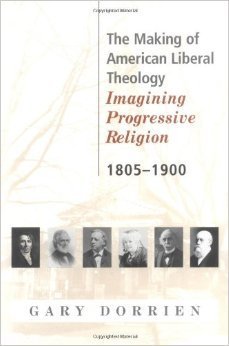 Gary Dorrien, the leading authority on American liberal theology, defines it in the first volume of his three-volume historical work:
Gary Dorrien, the leading authority on American liberal theology, defines it in the first volume of his three-volume historical work:
Fundamentally it is the idea of a
genuine Christianity not based on external authority.
Liberal theology seeks to
reinterpret the symbols of Christianity in a way that creates a progressive religious alternative to atheistic rationalism and to theologies based on external authority.
Specifically, liberal theology is defined by
its openness to the verdicts of modern intellectual inquiry, especially the natural and social sciences;
its commitment to the authority of individual reason and experience;
its conception of Christianity as an ethical way of life;
its favoring of moral concepts of atonement; and
its commitment to make Christianity credible and socially relevant to modern people.
—Gary Dorrien, The Making of American Liberal Theology: Imagining Progressive Religion 1805-1900 (Louisville, KY: Westminster John Knox Press, 2001), xxiii.
HT: Kevin DeYoung
December 8, 2014
Is Politics Really Downstream from Culture?
Greg Forster—whose Joy for the World: How Christianity Lost Its Cultural Influence and Can Begin Rebuilding It in Tim Keller and Collin Hansen’s Cultural Renewal series should be widely read—writes today about the UVA rape story and the problem of rape systems and rape cultures on college campuses.
In so doing, he makes a helpful point about what he calls the “now-fashionable turn away from ‘politics’ to ‘culture.'”
Nowadays, we hear it preached up and down the land that “politics is downstream from culture.” It’s certainly true that almost none of our most urgent problems will be cured, or even significantly affected, by one party or the other winning the next election. But, in fact, politics is not “downstream” from culture. Politics is part of culture, and some of our cultural problems are political problems that demand political solutions. The longer we ignore this, the more women will be brutalized by the rape system that now dominates Greek life at many large colleges.
Later in the essay he explains why “changing the culture” is not a sufficient solution:
Purely “cultural” approaches will not work, for the problem is political: it involves justice and law, and any solution would disrupt organized factions’ access to money and power. But the political solution must simultaneously be a cultural solution. It must create plausibility and credibility for the necessary reforms. We need political action that will strike not just terror but shame and self-loathing in the hearts of those who sustain the rape system, and give ordinary people—the silent frat brother or alumnus, the dean with a terrified young woman in his office—the bravery to do the right thing.
After proposing his own solution, Forster writes:
Nothing is stopping us from doing this but a lack of political imagination. We must remember how to think about politics as something more than a brutal clash of forces—as an arena for constructing expressions of dignity and justice. The more we chant “politics is downstream from culture,” the less we are able to think in those terms.
With apologies to Martin Luther King: I am aware that the law cannot make frat brothers respect women. But it can stop them from raping them, and that is also important.
You can read the whole thing here.
December 6, 2014
A 20th Century Classic: “The Master Plan of Evangelism”
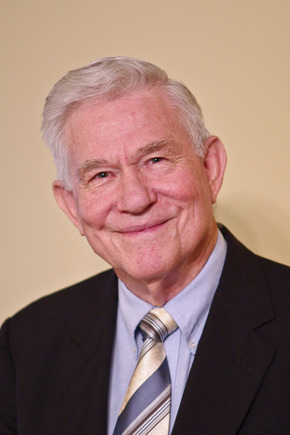 Dr. Robert E. Coleman (b. 1928) taught for 27 years at Asbury Theological Seminary and then directed the School of World Mission and Evangelism at Trinity Evangelical Divinity School for 18 years, during which time he also led the Institute of Evangelicalism in the Billy Graham Center at Wheaton College. Since 2001 he has been associated with Gordon-Conwell Theological Seminary as Distinguished Senior Professor of Discipleship and Evangelism.
Dr. Robert E. Coleman (b. 1928) taught for 27 years at Asbury Theological Seminary and then directed the School of World Mission and Evangelism at Trinity Evangelical Divinity School for 18 years, during which time he also led the Institute of Evangelicalism in the Billy Graham Center at Wheaton College. Since 2001 he has been associated with Gordon-Conwell Theological Seminary as Distinguished Senior Professor of Discipleship and Evangelism.
In 1963 Coleman published his book on The Master Plan of Evangelism, which boasts over 3.5 million copies sold. Billy Graham would later write a foreword for the book, claiming that few books have had more impact on the cause of world evangelization than this one. For Graham, the secret of the book’s success is Coleman’s disinterest in drawing upon the latest trends or techniques, but his return to the Bible to ask one simple but crucial question: what was the evangelism strategy of Jesus Christ?
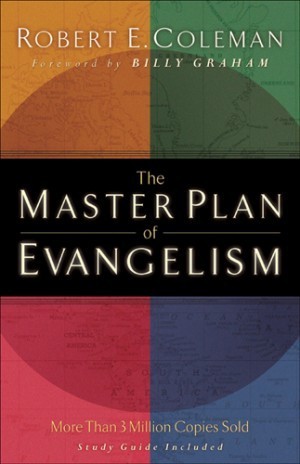 In order to answer this question, Coleman identifies eight guiding principles from the life and practice of Jesus, outlined below. These principles in the life of Jesus were not sequential but overlapping. Nevertheless, Coleman discerns a logical progression at play. Coleman begins this work by asking whether our evangelistic efforts are truly “fulfilling the Great Commission”—in other words, is there an ever-expanding company of people dedicated to reaching the world with the gospel on account of our ministry? What is needed, Coleman argues, is a carefully constructed strategy that entails day-by-day movement toward this long-range goal. That is why Coleman has engaged in this study of the principles of evangelism that oriented and determined the methodology of Jesus’s earthly ministry.
In order to answer this question, Coleman identifies eight guiding principles from the life and practice of Jesus, outlined below. These principles in the life of Jesus were not sequential but overlapping. Nevertheless, Coleman discerns a logical progression at play. Coleman begins this work by asking whether our evangelistic efforts are truly “fulfilling the Great Commission”—in other words, is there an ever-expanding company of people dedicated to reaching the world with the gospel on account of our ministry? What is needed, Coleman argues, is a carefully constructed strategy that entails day-by-day movement toward this long-range goal. That is why Coleman has engaged in this study of the principles of evangelism that oriented and determined the methodology of Jesus’s earthly ministry.
Selection. The first method of Jesus for winning the world was to choose average men who were teachable, honest, and willing to confess their need. Jesus intentionally kept the group small enough in order to work effectively with them and to mold them. Jesus had many disciples, but he concentrated on the Twelve and gave special attention to three. The principle here is that the more concentrated the size of the group, which requires selectivity, the more potential there is for effective training. And he focused these efforts as part of a genius strategy to ultimately reach the masses.
Association. Having selected his concentrated group, the essence of Jesus’s training program was to be with them and to let them follow him. For Jesus, association preceded explanation as a means of imparting knowledge. It was in the context of association that knowledge and faith could be enlarged. He gave them constant personal attention, like a father with his children. It would be insufficient for a father to raise his child only seeing him once a week, and so we must imitate our Savior in staying with new believers as much as possible in order to model the Christian life, clarify the truth, and answer questions.
Consecration. Jesus valued loyalty before intelligence. Willingness to obey—to count the cost and to pay the price—was the very means by which they learned more truth. This desire to dedicate oneself to Christ and to deny one’s own self is in contrast to the indifference and complacency of many today within the church. Obedience is essential before conquest.
Impartation. Jesus gave away all that he had to his disciples, including his peace, his joy, the keys to the kingdom, his glory, and even his life. Jesus’s sanctification was his constant renewal of himself to his Father through loving service to others. His evangelistic strategy hinged upon this, designed so that his disciples would follow the way of their master and similarly impart the love of God to others. Therefore, our service and devotion to God must issue forth in love for others. Jesus’s disciples came to see that all of their work was altogether the work of the Spirit, to whom they must yield complete charge of their lives.
Demonstration. Jesus demonstrated for his disciples how to live, including how to pray, how to use Scripture, and how to win souls. His method was to conceal that he had a method, for the method was himself. It was real, practical, and came naturally. Jesus never required them to do something he had not done himself.
Delegation. In the beginning of Jesus’s ministry his disciples did little more than follow him and observe him. But toward the end, Jesus began to push them out of the nest, as it were. They were to follow his evangelistic method of concentrating their time on various individuals in surrounding towns and connecting with follow-up leaders. They were to expect hardship in their ambassadorial roles as they were sent out in pairs to accomplish the mission. Evangelism, we should recognize, is not an optional part of being a disciple but a divine command, and we should be giving practical work assignments today and expect them to be followed out.
Supervision. Jesus’s interactions with his disciples involved a dynamic interplay of instruction and assignments. They were required to report back to him on what they did, and he saw their failures as teaching opportunities, using on-the-job training to show them what spiritual discernment looks like and correcting their faulty attitudes and perspective in the process. He interacted with them constantly and rebuked them when required in order to redirect them. Likewise, we must engage in personal, deliberate, and patient supervision of those we are training to be like Christ.
Reproduction. Jesus’s strategy was to produce disciples who would reproduce. The Great Commission culminates in teaching all people to observe and obey all that Christ commanded us. We can convert many people, but unless they become reproducing disciples, we are doing it wrongly. We only achieve success when we are assured that our work will continue in the life of the redeemed. The Master’s Plan of Evangelism works, but shortcuts don’t. Programs can never take the place of the Holy Spirit. When his plan is carried out as he intends, the gates of hell cannot prevail against the church.
In the epilogue to his work, Coleman lays out what he regards to be the essentials of implementing a plan of evangelism based on these principles. Acknowledging that elements of the method will vary, we must
make people a priority
begin with a few disciples
stay together with them
give them time
meet as a group
give them tangible assignments to express their commitment
keep them growing in grace and knowledge
help them carry their burdens, and then
let them carry on in the work itself.
The Genius of the Book
Part of the genius behind Coleman’s enduring work is his combination of Biblicism and simplicity.
Bibliclism. His focus is entirely upon the four authoritative Gospels, which keeps his writing from being bogged down with secondary literature and discussions.
Simplicity. This is not an “easy” strategy to implement, but neither is it complicated. It requires no specialized skills or knowledge but rather an understanding of how Jesus sought to disciple his followers to be disciples of others. Coleman takes an encouraging and realistic tone as he seeks to set forth the principles he discerns in the earthly ministry of Jesus.
Some Questions about the Book
While the main thrust of the book is commendable, and even personally challenging, there are several items that raise questions or that could have required further nuance from the author.
Title. It’s not entirely clear to me that the book should be on the master’s plan of evangelism so much as it is the master’s plan of discipleship. The focus is not on calling people to faith as it is sustaining and nurturing faith that already exists. I raise this only in case the title throws off the reader’s expectation.
Impartation of Life and Doctrine. Though Coleman sounds an appropriate warning against an intellectualist approach, there are times in which he seems to pit the insufficiency of knowledge, laws, and dogma over and against the importance of impartation through a living personality (ch. 2). But for Jesus it was both-and. While it’s true that community was the context for his teaching, the Great Commission requires us to teach people to observe all that he commanded us (Matt 28:20).
Keswickian. Coleman’s Keswickian tendencies are evident, especially in chapter 4 when he speaks about the secret of the victorious life, claims that the Spirit-filled life is not characteristic of all true Christians, and points readers to writings on this issue by Finney, Wesley, and Torrey, et al. [You can read a summary and critique of the Keswick movement-“let go and let God”—here.]
Methodology and the Spirit. There is an uneasy tension in the book between methodology and the effectuality of the Spirit. On the one hand, Coleman insists that nothing of eternal significance is accomplished apart from the Spirit, and at the same time, Coleman sometimes suggests an attitude of implementing the Master’s Plan will produce automatic results, such that world conquest is simply a matter of time if one uses this strategy.
Summing It Up
All in all, this is a clear, simple, and bold book, and it has been bearing fruit for the gospel for over five decades. Though more technical discussions have been written about Jesus’s method of discipleship, none have been as effective at equipping and motivating the church to put it into practice.
The virtues of Coleman’s book outweigh any of its limitations (the proportionality of my analysis devoted to each notwithstanding!). Even as I disagree with some of the theological formulations or presuppositions, or wish that they were expressed with more nuance, I recognize in this book invaluable counsel for discipling like Jesus to further the Great Commission.
December 5, 2014
How Can Christian Historians Do History for Both the Academy and the Church?
In an earlier post I summarized the perspective of six Christian historians who offered their take on the place of providence in historical interpretations.
In this post I want to look at what this means for the actual writing of history by Christians who want their works to be read in a largely secular academy.
David Bebbington asks a practical question that confronts a Christian historian: “If he makes plain his religious commitment in his writing, will he not be excluding it from general notice and certainly from academic attention?” Bebbington states the situation frankly: “Historiography that draws attention to traces of providence is unacceptable to the world at large.”
Bebbington responds by reminding us of the rhetorical function of historiography. The historian writes not for himself but for a specific audience, and therefore, “His arguments have to be framed so as to persuade his audience of the validity of his case.” If what the historian writes is likely to be ignored outside of the community of faith, then perhaps “a providential framework should be more explicit in some pieces of writing than in others.”
Even when a piece of history has been shorn of specific Christian allusions, the Christian vision of history can still have shaped its composition. The task can be conceived from the beginning as an investigation of the historical process under God’s control although no reference is eventually made to his activity. The final version will still be entirely consistent with the Christian view of history. What is written will be a distinctively Christian product, but the Christian content will be implicit rather than explicit. If the same piece of history is needed for a Christian audience or to vindicate a Christian position, reference to providence can readily be restored. The Christian historian can discern God at work in the past without necessarily writing of him there. . . . [T]he Christian historian is not obliged to tell the whole truth as he sees it in every piece of historical writing.
Ian Clary, whose dissertation is on the historiography of pastor-historian Arnold Dallimore, cites a provocative biblical precedent along these lines:
If the author of Esther can write a history with only a veiled reference to YHWH, why should naturalist Christian historians be castigated for not mentioning the direct intervention of God in their historical narratives? Not only should Esther be seen as a biblical justification for professional historians writing for the academy, but it can also provide helpful tools for historians who do wish to subtly insert their theological convictions in their work. Just as the author to Esther directs his or her story along certain ironic lines leaving readers with the distinct implication that YHWH was working behind the scenes, so too can Christian historians write in such a way as to imply the presence of divine intervention. . . .
Bebbington himself takes a both-and approach to this issue, keeping his audiences in view: “There is sometimes a need for the providential framework of history to be portrayed without reserve. For the church, it provides the encouragement of knowing that hitherto the Lord has helped his people.”
Harry Stout’s approach is similar. He wants to follow Paul’s maxim to be “all things to all people” (1 Cor 9:22): “I am both a professional historian and a Christian historian, a dual practitioner sometimes emphasizing one or the other without ever wholly neglecting either.”
Andrew Atherstone reaches a similar conclusion: pastors and scholars can learn from one another, recognizing that their primary vocations are not the same:
The one is called to expound biblical truth; the other to examine historical evidence. Both are important. Both are to be valued. . . .
Let us not then dismiss either the ‘confessional’ or the ‘professional’ historian as lacking in critical rigour or spiritual vigour. The church needs both because they serve different functions in edification and witness to a watching world.
Both styles of writing history have their strengths and weaknesses as they address different audiences for different purposes:
We need providentialist history which explicitly sets out to encourage the Christian believer, to teach, exhort and challenge. . . . It is often the calling of pastors to write them. But we also need naturalist history which speaks to a wider audience, taking careful note of culture and context as well as doctrine and devotion.
In a final post next week I’ll suggest some qualifications and takeaways from this discussion for the task of responsible Christian historiography.
Sources
Andrew Atherstone, “Hagiography and History,” in Truth at Any Cost: Papers Read at the 2012 Westminster Conference (Stoke-on-Trent, England: Tentmaker Publications, 2013), 40-60.
David Bebbington, Patterns in History: A Christian Perspective on Historical Thought, reprint ed. (Vancouver, BC: Regent College Press, 1990), 172-186.
Harry S. Stout, “Biography as Battleground: The Competing Legacies of the Religious Historian,”Books & Culture 2 (July/August 1996): 9-10.
December 4, 2014
Should Christian Historians Appeal to Providence in Their Interpretations?
Although Christian historians may disagree among themselves regarding the precise nature or extent of God’s providence, all affirm its reality and importance as those who trust in the God who has decisively revealed himself through Christ in his authoritative Word and who is at work throughout history.
And yet there is a debate about how providence should be used in the writing of history, especially before the academy.
On the one hand, the area of contention has to do with epistemological confidence: can a historian read providence from events as an interpretive tool of historiography?
It also has to do with contextualization: is a Christian historian writing for a secular audience obligated to convey all that he believes?
If you’re new to this debate, here is a summary of some of the arguments and presuppositions from several Christian historians.
Tom Nettles
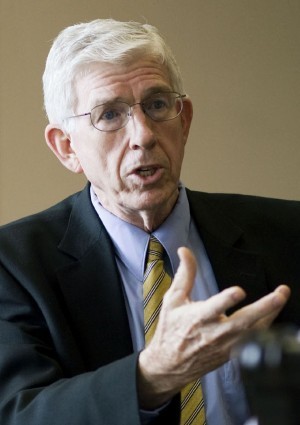 Tom Nettles (The Southern Baptist Theological Seminary, emeritus) provides a vigorous defense of providential historiography. He critiques the new evangelical historiographers as “cautious evangelical historians who discipline their writing by the conviction that their final product must be profane, not in the sense of aggressive blasphemy, but in the sense of being defined by non-religious purposes.” Nettles believes that “A theist who tries to write history as if there were no God, performs as, and presents the world as, an atheist.” Providence is key for Nettles: “If the factor of providence . . . may be as easily included with no loss of coherence in argument, does this not qualify as an argument for atheism?” “A theist who tries to write history as if there were no God, performs as, and presents the world as, an atheist.” Nettles suggests that the Christian faith involved “a kind of connectedness with history that expands the possible explanatory framework of empirical data” and that Christian experience involves “an expansion of awareness which operates both subjectively and objectively in the historiographical process.”
Tom Nettles (The Southern Baptist Theological Seminary, emeritus) provides a vigorous defense of providential historiography. He critiques the new evangelical historiographers as “cautious evangelical historians who discipline their writing by the conviction that their final product must be profane, not in the sense of aggressive blasphemy, but in the sense of being defined by non-religious purposes.” Nettles believes that “A theist who tries to write history as if there were no God, performs as, and presents the world as, an atheist.” Providence is key for Nettles: “If the factor of providence . . . may be as easily included with no loss of coherence in argument, does this not qualify as an argument for atheism?” “A theist who tries to write history as if there were no God, performs as, and presents the world as, an atheist.” Nettles suggests that the Christian faith involved “a kind of connectedness with history that expands the possible explanatory framework of empirical data” and that Christian experience involves “an expansion of awareness which operates both subjectively and objectively in the historiographical process.”
Carl Trueman
 Fellow Calvinist Carl Trueman (Westminster Theological Seminary) objects to this use of providence. He is not responding to Nettles below but simply offering his two primary reasons for not using providence as a tool of historical interpretation.
Fellow Calvinist Carl Trueman (Westminster Theological Seminary) objects to this use of providence. He is not responding to Nettles below but simply offering his two primary reasons for not using providence as a tool of historical interpretation.
First, providential readings of history “attempt to explain particulars in terms of a universal, which is remarkably unhelpful in its limitations.” Trueman gives the illustration of the terrorist attacks on 9/11. Saying that the Twin Towers fell because of providence says little more than saying they fell because of gravity. “To claim the latter is to speak truth, but it is also to explain nothing about what really happened that day.” The provenance of the historian is found in the particulars, but providence is a universal, since God causes all things. According to Trueman, “universal causes are of no great use in particular explanations.”
Second, Trueman judges that providential readings of history “claim to read God’s will off the surface of historical events in a glib and easy manner.” The problem, Trueman avers, is that the claim is unfalsifiable. “Once the ‘God’s providence’ card is played, the argument is over.” Furthermore, the providence pronouncement entails a “gnostic connection to which others have no access.”
In summary, according to Trueman, “providence may well be a sound theological doctrine, but it really has no place in the toolbox of the historian because it pushes the historian beyond the realms of what is and is not verifiable according to the canons of evidence and interpretation.”
John Fea
 John Fea (Messiah College) shares this perspective. “Providence,” he writes, “is a theological idea that is directly related to the character and behavior of God. History, however, is a discipline that seeks to explain the character and behavior of humans as they lived through time.” According to Fea, “providence is an unhelpful category in the interpretation of the past.” It belongs in the toolbox of the theologian but not that of the historian.
John Fea (Messiah College) shares this perspective. “Providence,” he writes, “is a theological idea that is directly related to the character and behavior of God. History, however, is a discipline that seeks to explain the character and behavior of humans as they lived through time.” According to Fea, “providence is an unhelpful category in the interpretation of the past.” It belongs in the toolbox of the theologian but not that of the historian.
Fea builds his case theologically. God’s providence is an inscrutable mystery, and human interpreters are finite and fallible. Therefore, “Christian historians would do better to approach their task with a sense of God’s transcendent mystery, a healthy dose of humility, and a hope that one day soon, but not now, we will all understand the Almighty’s plans for the nations.”
Fea’s plea is that writers of providential history “resist the temptation to bow to the gods of modernity—gods who want to scientifically decipher the workings of the divine and claim to know, with a degree of Enlightenment certainty, the will of a sovereign God who created the modern world and will end it when he sees fit. Until then, we see through a glass darkly.”
Timothy Larsen
 Timothy Larsen (Wheaton College) writes academic history using “methodological naturalism.” He insists that “This is not, as is often said or at least implied, a mere pandering to the secular academy, a refusal to say all that I know or ought to know as a believer in order to gain outside recognition.”
Timothy Larsen (Wheaton College) writes academic history using “methodological naturalism.” He insists that “This is not, as is often said or at least implied, a mere pandering to the secular academy, a refusal to say all that I know or ought to know as a believer in order to gain outside recognition.”
Nor does Larsen, who is theologically charismatic, deny that Christians can have access to a divine perspective on contemporary events.
What he objects to is the assumption that the act of historical research generates such insights. This is to confuse the work of an academic historian with the ministry of the prophet. Events by themselves are too ambiguous—good things happen to bad people, bad things happen to faithful people—to identify definitively any such cause-and-effect chain by natural means. To declare that an earthquake is a divine judgment and not just a tragedy to be endured is to speak for God; and more, to the point, to declare ‘thus saith the Lord’ without being inspired by the Holy Spirit is a foolish, dangerous, and indeed sinful, act. Larsen reminds us that a major theme of both the Bible and the Christian tradition (not least Reformed thought) is that God’s ways are often inscrutable.
Harry Stout
 Harry Stout (University of Yale) frames his discussion by identifying three levels of history, each of which is proper within its sphere and improper when applied outside of it: (1) temporal or mundane history, (2) providential history, and (3) divine or inspired history.
Harry Stout (University of Yale) frames his discussion by identifying three levels of history, each of which is proper within its sphere and improper when applied outside of it: (1) temporal or mundane history, (2) providential history, and (3) divine or inspired history.
Temporal or mundane history has to do with “natural or secondary causes; the social, political, economic, and intellectual history that all historians, whatever their personal beliefs, practice by observing the rules of evidence and adhering to a common pursuit of truth that all can agree upon.”
Providential history is “seen through the lens of supernatural faith.” This is what makes Christian historians different from non-Christian historians. The former believe and assert that “the ultimate force in history, lying behind and above all secondary causes, is the God of Scripture.” The non-Christian historians might ascribe finality to this or that mundane force or factor, but Christians see God’s sovereign hand not only in Scripture but also in the ongoing history of the church. The Christian historian should affirm God’s grand providence, a perspective distinct from both non-Christian historians (who assign determination and sovereignty to the mundane) and fellow Christians (who are tempted to assign definitive finality to their own interpretation of providence).
Divine or inspired history is confined to a small company: “God and to those ancient biblical chroniclers who wrote through direct, divine inspiration.” As a Protestant, Stout believes that Scripture is the only text of divine and sacred history. “There is no other inspired history anytime, anywhere . . . it must be read and received as sui generis.”
Whereas Stout critiques non-Christian historians for confusing the first and second levels of interpretation (mundane history and providential history), he critiques some of his fellow Protestants for failing to make the necessary distinctions between the second and third levels (providential history and divine history). He admires and commends the deep faith of people like the Puritans or those who debate whether American is a “chosen nation,” while disagreeing with their “conviction bordering on biblical certainty.” They might affirm the uniqueness of the Bible, but their writing can read like another chapter added to the Holy Scriptures. Stout argues that if the interpretive layers are not kept within their proper spheres, the result is a problem of “massive propositions,” namely, that of “horribly distorted legacies.”
David Bebbington
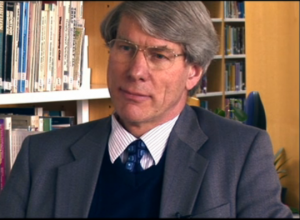 David Bebbington (University of Stirling) argues that “Divine interventions seem to be a necessary element in a Christian view of history.” The Christian historian “can write in conformity with his convictions that God is guiding the whole historical process. . . . He can say, for instance, that when good surprisingly emerges from evil, God is evidently at work. . . . The historian should take providence into account.”
David Bebbington (University of Stirling) argues that “Divine interventions seem to be a necessary element in a Christian view of history.” The Christian historian “can write in conformity with his convictions that God is guiding the whole historical process. . . . He can say, for instance, that when good surprisingly emerges from evil, God is evidently at work. . . . The historian should take providence into account.”
Bebbington even sees the danger of not recognizing divine providence in history: “If a Christian historian tries to write without a thought for providence, he is likely to succumb to some alternative view or blend of views that happen to be in fashion.” But providence is something a Christian cannot plausibly deny given what he has experienced: “The Christian . . . is aware of divine activity not only in the world but also in his own life. Personal experience of the intervention of God inclines him to discern it in the world as well.”
At the same time, Bebbington sounds a note of warning: the Christian historian “remains a fallible human being who can speak only with diffidence beyond his own experience. He will be cautious about identifying the divine interventions that he believes to take place in the historical process. He does not so much see them as glimpse them. The perception of particular providences, however real they may be, is no straightforward matter.”
In a future post, I’ll explore what this means for confessing historians who want to write both for the church and for the academy.
Sources
Tom J. Nettles, “Iain H. Murray, Revival and Revivalism: A Review Article,” The Baptist Review of Theology/La Révue Baptiste de Théologie 6 (Spring 1996): 67-79.
Carl R. Trueman, History and Fallacies: Problems Faced in the Writing of History (Wheaton, IL: Crossway, 2010), 166-67.
Timothy Larsen, “Evangelicals, the Academy, and the Discipline of History,” in Beyond Integration? Inter/Disciplinary Possibilities for the Future of Christian Higher Education, ed. Todd C. Ream, Jerry Pattengale, and David L. Riggs (Abilene, TX: Abilene Christian University Press, 2012), 105-21.
Harry S. Stout, “Biography as Battleground: The Competing Legacies of the Religious Historian,” Books & Culture 2 (July/August 1996): 9-10.
David Bebbington, Patterns in History: A Christian Perspective on Historical Thought, reprint ed. (Vancouver, BC: Regent College Press, 1990), 172-186.
December 3, 2014
Martin Luther King’s Response to “You Can’t Change the Heart Through Legislation”
In light of a grand jury’s decision not to indict (even for second-degree manslaughter) the police officer who killed asthmatic and unarmed Eric Garner (1970-2014)—who literally had his hands in the air and whose final words were “I can’t breathe”—I think it’s helpful to be reminded of this quote from Martin Luther King Jr.:
Now the other myth that gets around is the idea that legislation cannot really solve the problem and that it has no great role to play in this period of social change because you’ve got to change the heart and you can’t change the heart through legislation. You can’t legislate morals. The job must be done through education and religion.
Well, there’s half-truth involved here.
Certainly, if the problem is to be solved then in the final sense, hearts must be changed. Religion and education must play a great role in changing the heart.
But we must go on to say that while it may be true that morality cannot be legislated, behavior can be regulated.
It may be true that the law cannot change the heart but it can restrain the heartless.
It may be true that the law cannot make a man love me but it can keep him from lynching me and I think that is pretty important, also.
So there is a need for executive orders. There is a need for judicial decrees. There is a need for civil rights legislation on the local scale within states and on the national scale from the federal government.
—Martin Luther King Jr.’s address at Western Michigan University, December 18, 1963.
Justin Taylor's Blog
- Justin Taylor's profile
- 44 followers



